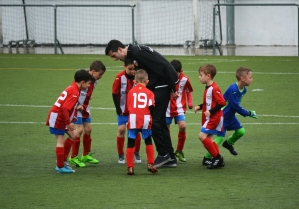
For the past 25 years, Dr. David Traver has dedicated his career to working with children who have autism and other neurodevelopmental disorders. Throughout this time, he has been privileged to witness numerous remarkable stories, but a few have left an indelible mark on his heart, as he shared in a recent op-ed in the Christian Post.
One such moment occurred during a Saturday soccer game when he saw a mother weeping on the sidelines.
Her son, a child with near-genius IQ, had long struggled to make friends, leading to a deep sense of loneliness. After one of their consultations, Dr. Traver extended a personal invitation to the mother and her son, asking them to join his soccer practice as friends. Though she had reservations—fearing her son might harm himself or others, or become overwhelmed and frustrated—she took the 30-minute drive to the field.
To her surprise, she saw the other children on the field rally around her son, encouraging him and helping him engage in the game. As she watched him enjoy being part of a group, perhaps for the first time in a long while, tears of joy streamed down her face.
The mother and son became regular participants, with the boy eagerly climbing into the car hours before it was time to leave each Saturday morning, anxious to return to the field.
This soccer game was part of the E-Sports program at Bay Area Christian Church, where Dr. Traver serves as an elder. The program is designed to be intentionally inclusive, catering to children of all abilities, both typical and atypical. Soccer is just one of many activities offered, all with the aim of fostering a sense of belonging and community.
Some might dismiss the full inclusivity of people with autism and other special needs as a fleeting trend or political maneuvering, he says. But in truth, the quest to include all people is a timeless and deeply human endeavor. "What is best in us as people and as civilizations is captured in our efforts to fully include all, without respect to their need or ability," he says.
However, achieving full inclusivity is not just about extending a helping hand to those with special needs; it is also about transforming ourselves, Dr. Traver says. The journey begins with an honest assessment of our perceptions. "We use euphemisms and mask a lot of our prejudices and stereotypes. We cloak our fear and discomfort in the same ways, even from ourselves. But what, exactly, are we afraid of?" he asks.
"Until we get honest about who we are, it’s hard to be what we need to be for others — and even harder to see others rightly.
"A child with special needs is no different inside than the rest of us. They are not a different sort of human person. They are precisely the same marvelous creatures we are — namely, bearers of God’s image," Dr. Traver says.
Relationships with individuals who have special needs often hold unique moral and emotional value. Unfortunately, many people tend to marginalize those with special needs, viewing their behaviors as strange, unreachable, or "other." But these behaviors, such as self-injury—common among those with autism—often stem from misunderstood and unaddressed pain. Many individuals with disabilities experience physical pain, like intestinal discomfort, which they cannot articulate or alleviate, leading them to harm themselves in frustration.
These children are not "strange" or defined by their conditions. "But for us to learn that we need to approach any special needs ministry prepared to listen. We need to learn from them with humility and love. They aren’t problems to be solved, but people to be known and cherished," he says.
"This exact inversion of priorities, the shift from centering self to centering others, is essential if we hope to love others or know ourselves at all. It’s one of the most important gestures of special needs ministry precisely because it undergirds Christian love as such and confronts our own shortcomings very directly."
When someone marginalizes people with special needs—whether due to ignorance, discomfort, fear, or unfamiliarity—they are likely doing the same with other groups, often without realizing it. Moral and emotional shortcomings cannot be easily compartmentalized; they tend to affect all areas of life.
The church plays a vital role in fostering right relationships, both with individuals with special needs and within the broader community. The church has the unique privilege of carrying God's word and love to all people, especially the most vulnerable.
While nothing can replace an individual's personal relationship with God, the church can offer practical support to those with special needs through friendship, social support, material aid, and ministries tailored to their unique circumstances. These ministries are powerful, transformative tools that can profoundly impact lives.
People of faith are uniquely positioned to exercise compassion and use their talents to help others, regardless of their profession. "It doesn’t matter if you’re a contractor, a therapist, an attorney, a teacher, or a mechanic," Dr. Traver says.
No one can do everything, but everyone can do something. "And as Christians, all of us — until the day we die — should be able to see our needs and the needs of others as one of our greatest avenues to greater and better love."
"After all, we don’t get inspired by people born with a silver spoon in their mouth. We get inspired by people who persevere through adversity. We get inspired by those who overcome. So become part of someone else’s fight. Learn from them. Help them. Love, know and cherish them. The life most transformed might be your own."





